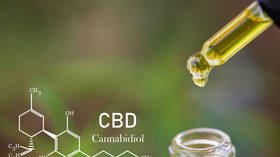Cannabis to the rescue? New research suggests CBD oil may protect against Covid-19 lung damage

Scientists have discovered that CBD oil may increase levels of a protective chemical in the lungs and other organs which could stave off the worst effects of Covid-19. However, more research is needed to apply this to treatment.
Cytokine is a type of protein secreted by immune cells in response to inflammation and infection. However, an overactive cytokine response during a particularly bad case of Covid-19, for instance, can wreak havoc on the lungs and even kill patients.
A naturally occurring peptide called apelin has been shown to reduce this response in laboratory models of another killer disease, adult respiratory distress syndrome, or ARDS.
Also on rt.com ‘Zombie-like symptoms’: McAfee warns of chemical infection through CBD vapesIn newly published research by scientists from the Dental College of Georgia and Medical College of Georgia, CBD oil has been shown to increase apelin levels, in addition to improving oxygen levels and reducing inflammation – and thus lung damage incurred – in ARDS.
Blood levels of apelin dropped to almost zero in the ARDS model but increased twenty-fold when CBD was administered.
“CBD almost brought it back to a normal level,” researcher Dr. Jack Yu said.
Apelin functions as a key regulator which helps normalize blood pressure and inflammation and is produced in the heart, lungs, brain, and blood. It works in tandem with the angiotensin-converting enzyme 2 (ACE2) receptor to control blood pressure.
However, ACE2 is the very means by which Covid-19 enters human cells and disrupts normal function.
The coronavirus interrupts the working relationship between ACE2 and apelin and prevents them from allowing blood vessels to relax, hijacking cells to produce more virus.
“It is an association; we don't know yet about causative, but it is a very good indicator of the disease,” researcher and DCG immunologist Babak Baban says.
Reduced ACE2 levels appear to have a knock-on effect on the production of apelin, and therefore reduce naturally occurring protection within the lungs and associated organs.
The researchers caution that more research is needed but point to the strong correlation found in their earlier work on ARDS and the important role played by apelin, as well as the benefits of increasing apelin levels via CBD treatment.
Also on rt.com Warsaw Zoo begins medical marijuana trial to help calm its stressed-out and grieving elephantsHowever, there is significant and ongoing debate within the scientific community as to the efficacy of CBD, which has been touted as a cure-all for conditions ranging from depression, chronic pain, and sleep disorders to recurring skin conditions like acne.
There is a dearth of evidence and clinical research to support these alleged benefits, with most of the support for CBD as a treatment stemming from anecdotal evidence.
“The public appears to believe CBD is medicine,” says Davey Smith, chief of infectious diseases and global public health at the University of California San Diego.
To date, the US Food and Drug Administration (FDA) has only approved one CBD-related treatment, which helps with epileptic seizures.
“It's being promoted for all kinds of purposes for which it's never been studied,” says James Adams, chief medical officer at Northwestern Medicine.
Think your friends would be interested? Share this story!














